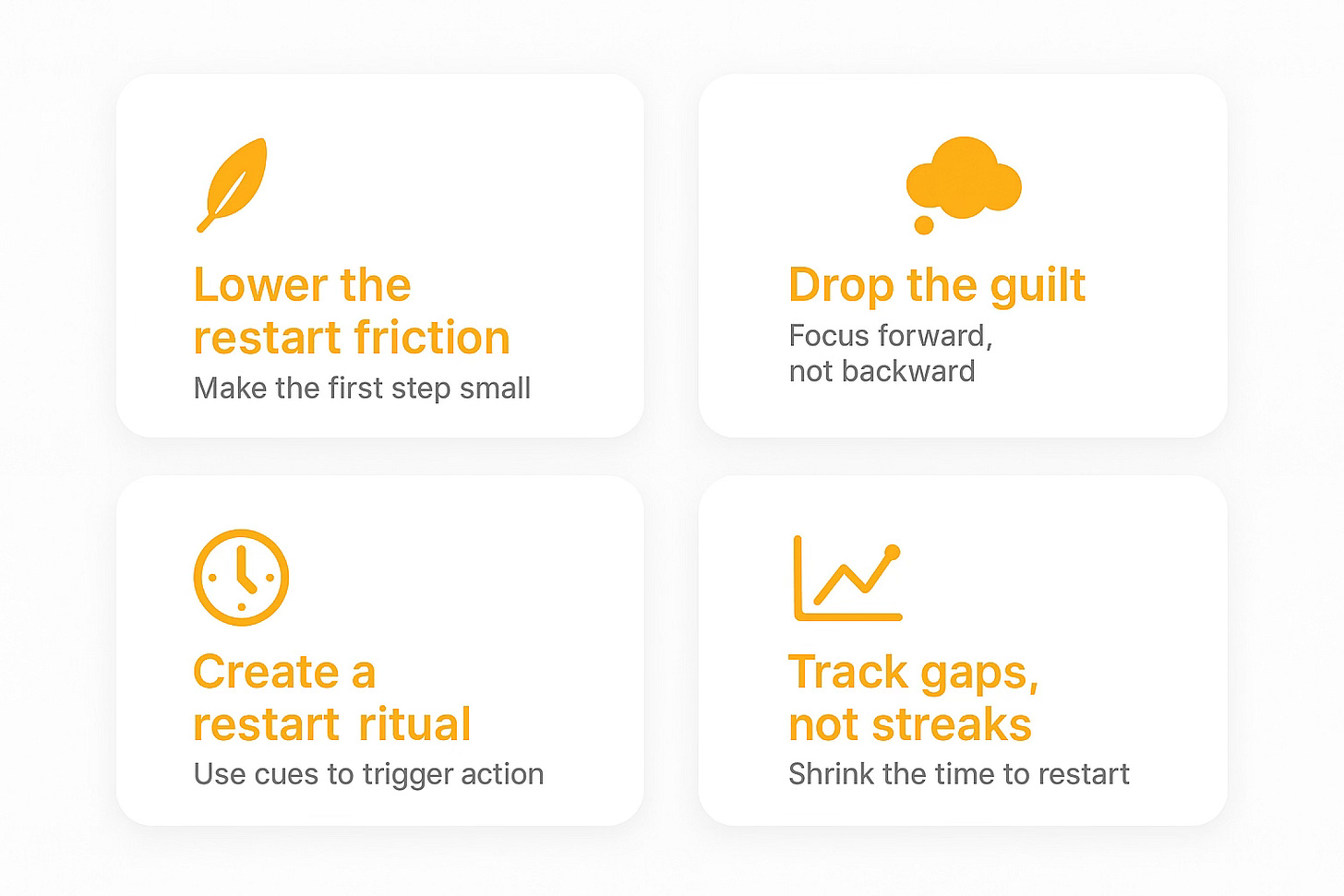You’ve Been Defining Consistency Wrong
I used to beat myself up every time I missed a day. I was like, “Damn, the streak broke”, and “I’m not starting it again”.
One skipped workout, one missed writing session, one broken streak, and I’d feel like I’d ruined everything.
That’s the trap most of us fall into.
Agree?
Consistency is very important for success, but we treat it like a perfect record as if missing once erases all the progress we’ve made.
But over time, I realised something:
It’s not the miss that kills your momentum, but it’s how long you take to come back.
The Recovery Gap
When looked at carefully, the gap and the time you took to bounce off are very important to get back on track.
It’s the space between the moment you fall off track and the moment you start again.
For most people, that gap is huge, really huge.
They miss a day and tell themselves they’ll restart “next Monday.”
They slip up once and decide the whole week is a write-off.
They wait for the “perfect time” to get going again, which never comes.
Why sacrifice a whole week for missing a damn day?
The days slowly increase if you fail to bounce back as quickly as possible.
Every extra day in that gap weakens your momentum. Your habit slips out of your daily rhythm. The task starts to feel heavier in your mind. And the longer you wait, the more you doubt your ability to return.
But when you shrink that gap, everything changes. You don’t give your brain time to negotiate with excuses. You act before the weight of inaction sets in. You turn recovery into a reflex.
It’s like,
Momentum fades — the habit loses its place in your daily rhythm.
Confidence erodes — you start doubting your ability to follow through.
The task grows bigger in your mind — restarting feels harder than it really is.
But when you shrink that gap, everything changes.
The lesser the gap, the better it is.
That’s why recovery speed is the real consistency skill.
Why Recovery Speed Wins Long-Term
When you focus on perfection, your progress becomes fragile. The moment you miss a day, your mind treats it like the streak is broken beyond repair.
That’s why I never use the “streaks” feature on any habit tracking app.
What happens here is that when you think all your effort has been wasted just for breaking one day of a streak, you give yourself permission to “start fresh” later. That delay is exactly what drains momentum.
But when you focus on recovery speed, you remove that fragility. A missed day doesn’t wipe the slate clean; it just becomes part of the process.
You bounce back before your habit has the chance to fade from your daily rhythm, and that’s very, very important for keeping your habit alive. Instead of obsessing over a perfect record, you start valuing resilience, which is far more important in the long run.
Another advantage of this mindset is that it changes the way you experience setbacks.
Think like this,
When you miss a day, it is not a failure but an opportunity to prove to yourself that you can return quickly.
Over time, the compounding effect is applied automatically. If you keep bouncing back quickly, it builds a habit of recovery, and that habit makes you unstoppable because it works in every area of life.
Whether it’s your health, business, creativity, or relationships, the faster you get back on track, the faster you continue moving forward.
How to Build Your Recovery Muscle
Understanding the value of recovery speed is one thing, but being able to do it in real life is another.
This section will guide you to build your recovery muscle like never before.
When you’re tired, frustrated, or disappointed in yourself, restarting can feel like pushing a boulder uphill. That’s why you can’t rely on willpower alone. You need systems and habits that make it easier to come back quickly, even when you don’t feel like it.
And please don’t rely on motivation because it’s BS. Motivation fades, but habits and systems never do.
1. Lower the restart friction
The longer you’ve been away from a habit, the harder it feels to come back. That’s why your first step after a break should be small.
If you skipped the gym for a week, don’t try to jump back in with your toughest workout; just go for 20 minutes.
If you haven’t written for days, don’t aim for 1,000 words; write a single paragraph.
Small actions get you moving without overwhelming you.
2. Drop the guilt
Guilt is the fuel for procrastination. The more you dwell on what you “should have” done, the less energy you have to take action now.
Train yourself to respond to a missed day with curiosity instead of criticism: “What made me stop?” rather than “Why am I so bad at this?”
That shift keeps your focus forward instead of being stuck in the past.
3. Create a restart ritual
Your brain loves cues. Use them to your advantage by building a simple ritual that signals “it’s time to start again.”
For example, a specific playlist you listen to before writing, a warm-up set before your workout, or brewing a fresh cup of coffee before opening your laptop.
Over time, these cues make restarting automatic.
4. Track gaps, not streaks
Most people measure their success by how long they can go without missing a day. Instead, measure how quickly you can return after you miss one.
Keep a log: if you missed three days last month and bounced back in 2 days each time, aim for 1 day next month. This turns recovery into a game you can win repeatedly.
And please don’t trust streaks. It’s one of the real culprits that makes you feel guilty.
When you practice these steps consistently, you stop fearing the moments you fall off track. Instead, you start trusting your ability to return, and that trust is what keeps you going for the long haul.
The Real Definition of Consistency
Consistency is not about maintaining the streaks; it’s about resilience. It’s the ability to keep showing up after life inevitably knocks you off track.
Missing a day doesn’t erase your progress.
Missing a week doesn’t mean you’ve failed.
What matters is shortening the time it takes to return to your routine. That quick recovery keeps your momentum alive and your confidence intact.
In the end, the most consistent people aren’t the ones who never stumble, but they’re the ones who’ve mastered the art of coming back fast. And over time, that skill will always outlast perfection.





